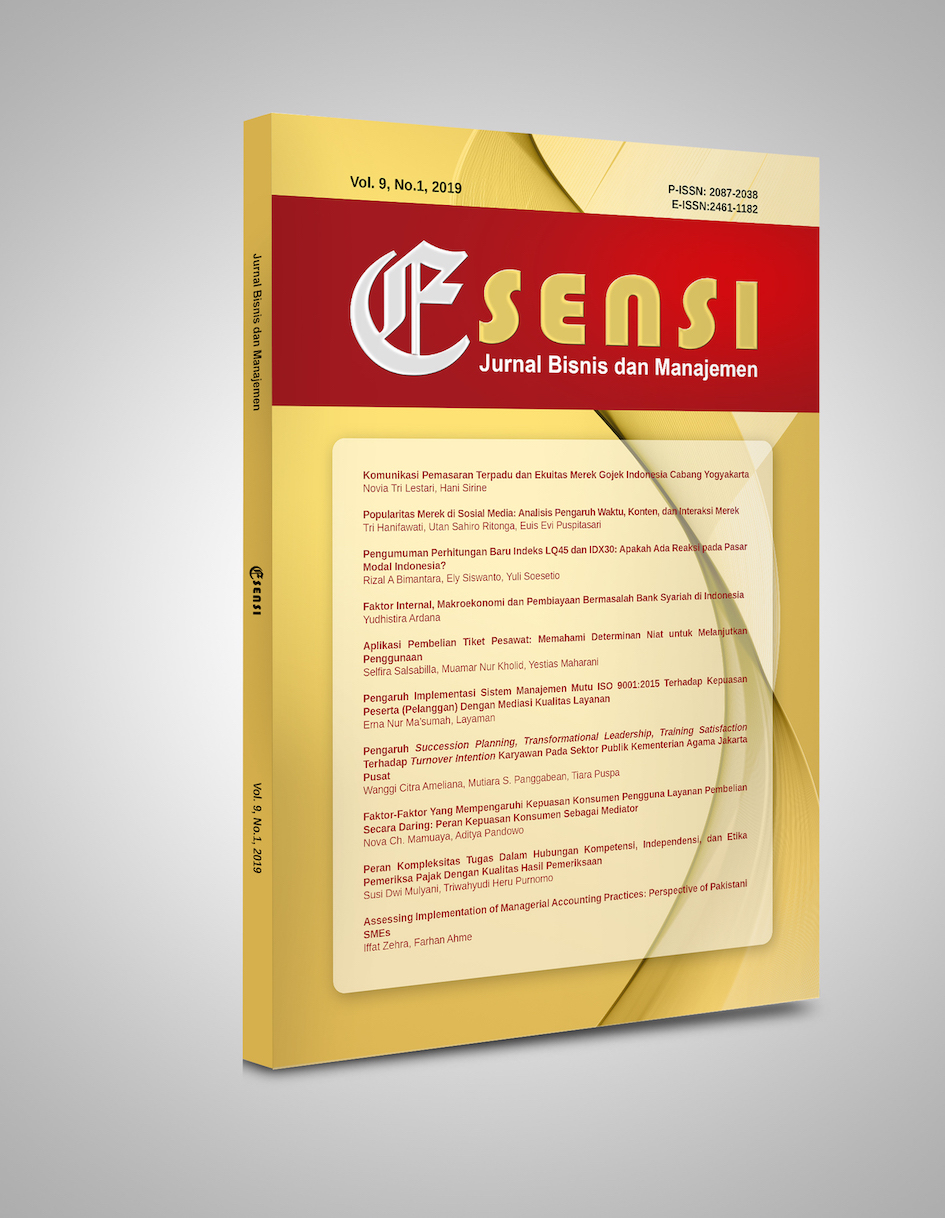Pengaruh Succession Planning, Transformational Leadership, Training Satisfaction Terhadap Turnover Intention Karyawan Pada Sektor Publik Kementerian Agama Jakarta Pusat
DOI:
https://doi.org/10.15408/ess.v9i1.12491Keywords:
succession planning, transformational leadership, training satisfaction, turnover intentionAbstract
This study tries to analyze the effect of succession planning, transformational leadership, training satisfaction on employee turnover intention in the public sector of the Central Jakarta Ministry of Religion. Responding to this study, an experiment of 120 respondents from the Central Jakarta Ministry of Religion staffing company. The sampling method uses purposive sampling and uses descriptive statistical data analysis methods (average) and multiple regression analysis. In this research, succession planning, transformational leadership, and training satisfaction, were obtained negatively towards company turnover intention in the public sector, especially succession planning. From the results of this study, it was agreed by the leadership of the company to pay more attention to succession planning or management of employee talents, allow and add training and coaching for future leaders to be more transformational to provide beneficial investments in terms of employee career development.
References
Afzali, A., Motahari, A. A., & Hatami-Shirkouhi, L. (2014). Investigating The Influence of Perceived Organizational Support, Psychological Empowerment and Organizational Learning on Job Peformance: An Empirical Investigation. 21(3), 623–629.
Ali, F., Omar, R., & Amin, M. (2013). An examination of the relationships between physical environment, perceived value, image and behavioural Intentions: A SEM approach towards Malaysian. Journal of Hotel and Tourism Management, 27, 9–26.
Ali, Z., & Mehreen, A. (2019). Understanding succession planning as a combating strategy for turnover intentions. Journal of Advances in Management Research, 16(2), 216–233. https://doi.org/10.1108/JAMR-09-2018-0076
Amankwaa, A., & Anku-Tsede, O. (2015). Linking Transformational Leadership to Employee Turnover: The Moderating Role of Alternative Job Opportunity. International Journal of Business Administration, 6(4). https://doi.org/10.5430/ijba.v6n4p19
Brendan Sweeney, Q. I. P.-D. F. (2013). Success through Succession: A Review of Recent Literature.
Cheung, M. F. Y., & Wong, C. S. (2011). Transformational leadership, leader support, and employee creativity. Leadership & Organization Development Journal, 32(7), 656–672. https://doi.org/10.1108/01437731111169988
Davenport, S., Committee, R., Chairperson, C., Management, A., Faculty, D. S., Member, C., … Riedel, E. (2012). Walden University.
Govender, I. (2010). Succession Planning as a tool to minimise staff turnover rate : A case study of Nedbank Homeloans ’ KZN operations . (June).
Gyensare, M. A., Anku-Tsede, O., Sanda, M.-A., & Okpoti, C. A. (2016). Transformational leadership and employee turnover intention. World Journal of Entrepreneurship, Management and Sustainable Development, 12(3), 243–266. https://doi.org/10.1108/wjemsd-02-2016-0008
Gyensare, M. A., Kumedzro, L. E., Sanda, A., & Boso, N. (2017). Linking transformational leadership to turnover intention in the public sector: The influences of engagement, affective commitment and psychological climate. African Journal of Economic and Management Studies, 8(3), 314–337. https://doi.org/10.1108/AJEMS-07-2016-0099
Hair, J.F. Jr., R.E. Anderson, R. L. T. & W. C. B. (2009). Multivariate Data Analysis (7 Edition). New Jersey: Perason Prentice-Hall Int.
Huang, W. R., & Su, C. H. (2016). The mediating role of job satisfaction in the relationship between job training satisfaction and turnover intentions. Industrial and Commercial Training, 48(1), 42–52. https://doi.org/10.1108/ICT-04-2015-0029
Jehanzeb, K., Rasheed, A., & Rasheed, M. F. (2013). Organizational Commitment and Turnover Intentions: Impact of Employee’s Training in Private Sector of Saudi Arabia. International Journal of Business and Management, 8(8), 79–90. https://doi.org/10.5539/ijbm.v8n8p79
Jenderal, K. A. R. I. B. K. S. (2018). PNS Kementerian Agama dalam Angka. Retrieved from http://simpeg.kemenag.go.id
Jha, S., & Malviya, V. (2017). Impact of transformational leadership on employee engagement. Pranjana:The Journal of Management Awareness, 20(2), 15. https://doi.org/10.5958/0974-0945.2017.00011.5
Long, C. S., Thean, L. Y., Ismail, W. K. W., & Jusoh, A. (2012). Leadership styles and employees’ turnover intention: Exploratory study of academic staff in a Malaysian college. World Applied Sciences Journal, 19(4), 575–581. https://doi.org/10.5829/idosi.wasj.2012.19.04.155
Lu, L., Lu, A. C. C., Gursoy, D., & Neale, N. R. (2016). Work engagement, job satisfaction, and turnover intentions: A comparison between supervisors and line-level employees. International Journal of Contemporary Hospitality Management, 28(4), 737–761. https://doi.org/10.1108/IJCHM-07-2014-0360
Malek, K., Kline, S. F., & DiPietro, R. (2018). The impact of manager training on employee turnover intentions. Journal of Hospitality and Tourism Insights, 1(3), 203–219. https://doi.org/10.1108/jhti-02-2018-0010
Mehrabani, S. E., & Mohamad, N. A. (2011). Succession Planning: A Necessary Process in Today’s Organization. International Journal of E-Education, e-Business, e-Management and e-Learning, 1(5). https://doi.org/10.7763/ijeeee.2011.v1.61
Memon, M. A., Sallaeh, R., Baharom, M. N. R., Md Nordin, S., & Ting, H. (2017). The relationship between training satisfaction, organisational citizenship behaviour, and turnover intention: A PLS-SEM approach. Journal of Organizational Effectiveness, 4(3), 267–290. https://doi.org/10.1108/JOEPP-03-2017-0025
Memon, M. A., Salleh, R., & Baharom, M. N. R. (2016). The link between training satisfaction, work engagement and turnover intention. European Journal of Training and Development, 40(6), 407–429. https://doi.org/10.1108/EJTD-10-2015-0077
Mittal, S. (2016). Effects of transformational leadership on turnover intentions in IT SMEs. International Journal of Manpower, 37(8), 1322–1346. https://doi.org/10.1108/IJM-10-2014-0202
Nissan, J., & Eder, P. (1995). Practicing OD. Evaluation Review, 49(3), 76–84. https://doi.org/10.1177/0193841X9501900506
Oh, J., & Oh, S. (2017). Authentic leadership and turnover intention: does organizational size matter? Leadership and Organization Development Journal, 38(7), 912–926. https://doi.org/10.1108/LODJ-08-2016-0209
Payne, R. A., Hovarter, R., Howell, M., Draws, C., & Gieryn, D. (2018). Succession Planning in Public Health: Addressing Continuity, Costs, and Compliance. Nurse Leader, 16(4), 253–256. https://doi.org/10.1016/j.mnl.2018.05.008
Reeves, T. Z. (2010). Mentoring Programs in Succession Planning. State and Local Government Review, 42(1), 61–66. https://doi.org/10.1177/0160323x10368036
Romadhon, R. W., & Indonesia, U. I. (2018). Analisis Pengaruh Training Satisfaction dan Psychological Empowerment terhadap Work Engagement dan Turnover Intention Analisis Pengaruh Training Satisfaction dan Psychological Empowerment terhadap Work Engagement dan Turnover Intention Bidang Kosentrasi : (October). https://doi.org/10.13140/RG.2.2.23222.75841
Tayal, R., Kumar Upadhya, R., Yadav, M., Rangnekar, S., & Singh, R. (2018). The impact of transformational leadership on employees’ acceptance to change: Mediating effects of innovative behaviour and moderating effect of the use of information technology. VINE Journal of Information and Knowledge Management Systems, 48(4), 559–578. https://doi.org/10.1108/VJIKMS-05-2018-0039
Wahyuni, A. S., Zaika, Y., Anwar, R., Brawijaya, U., & Timur, J. (2014). Analisis Faktor-Faktor Yang Mempengaruhi Turnover Intention ( Keinginan Berpindah) Karyawan. Jurnal Rekayasa Sipil, 8(2), 89–95.


